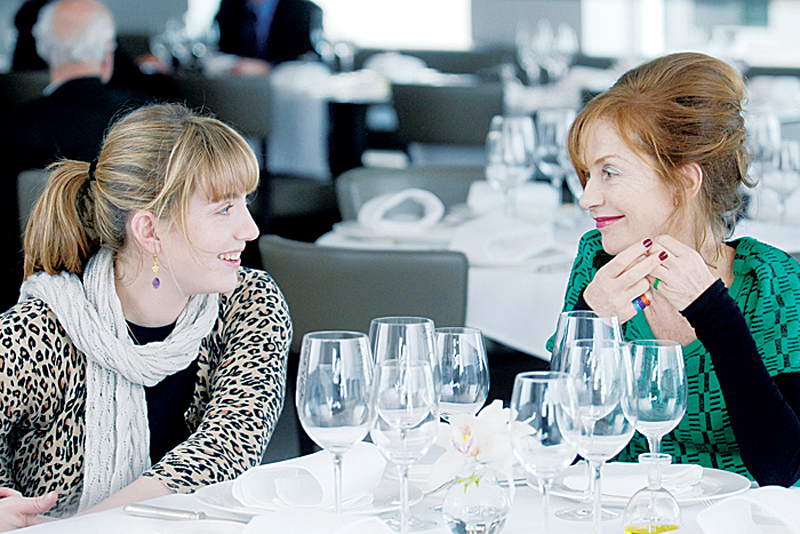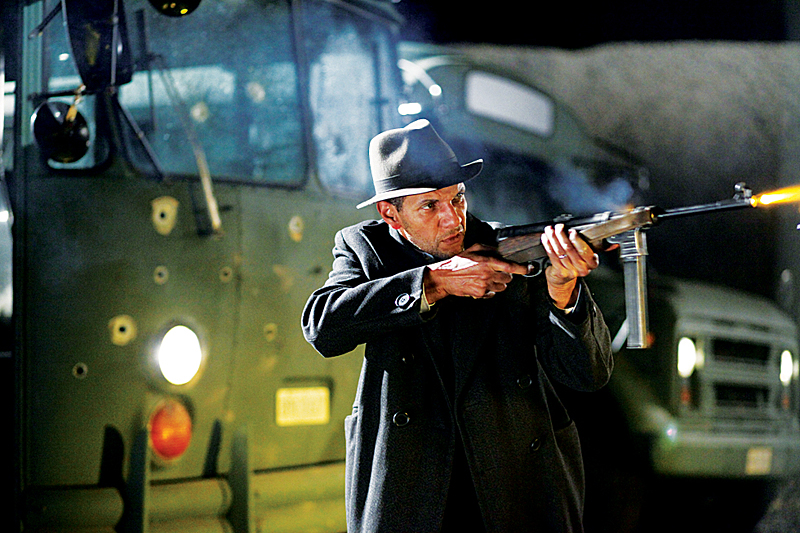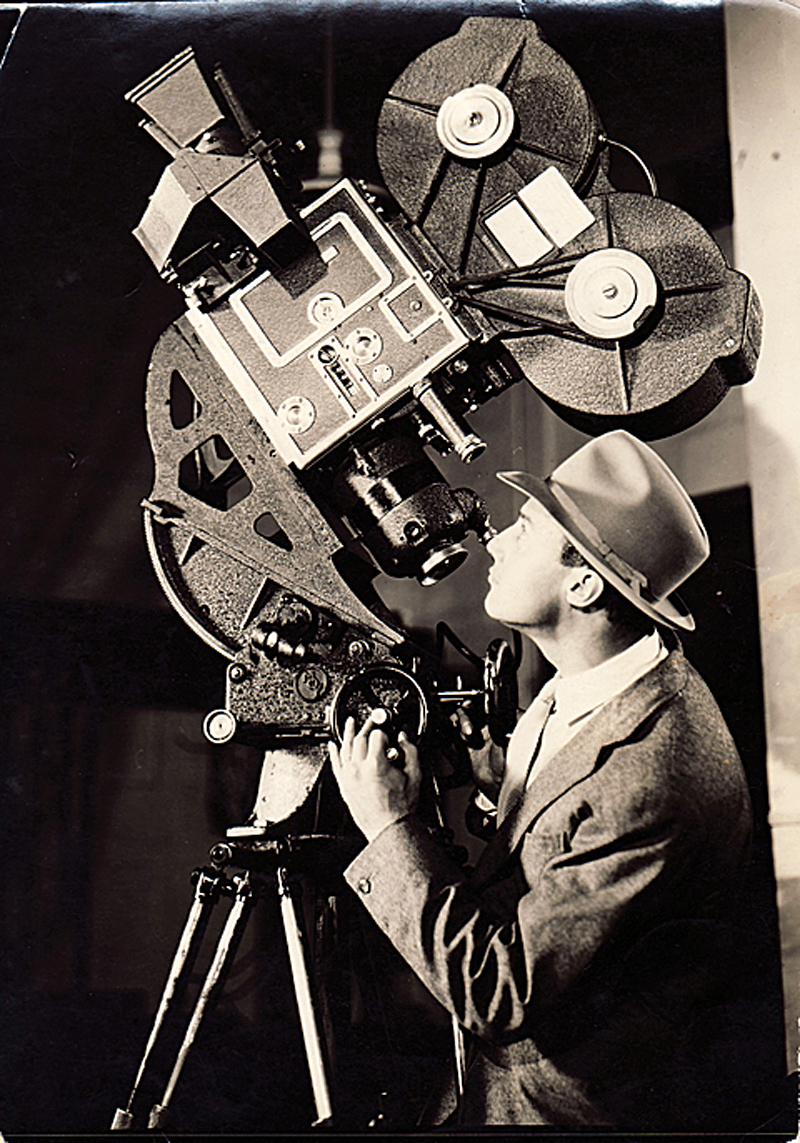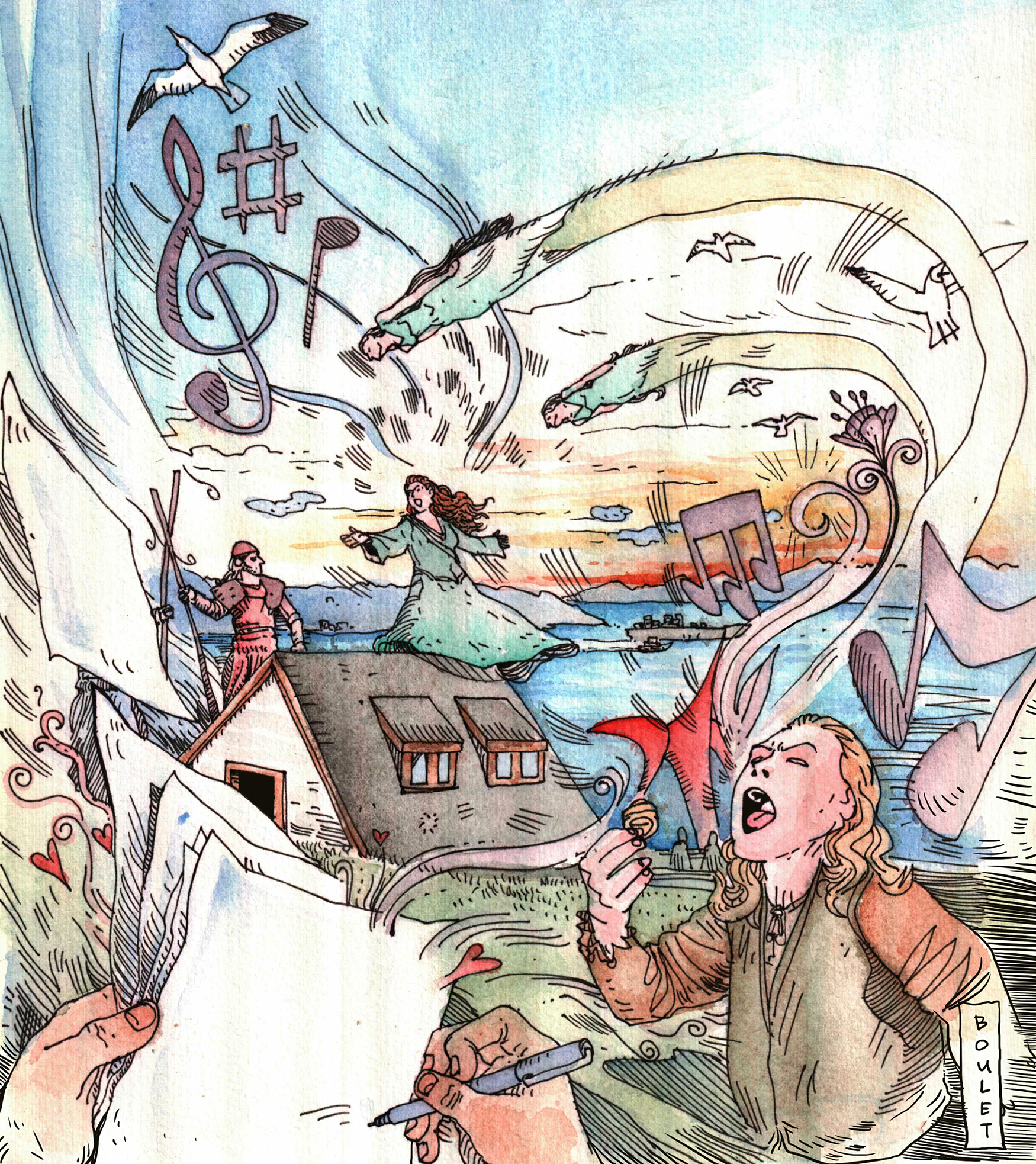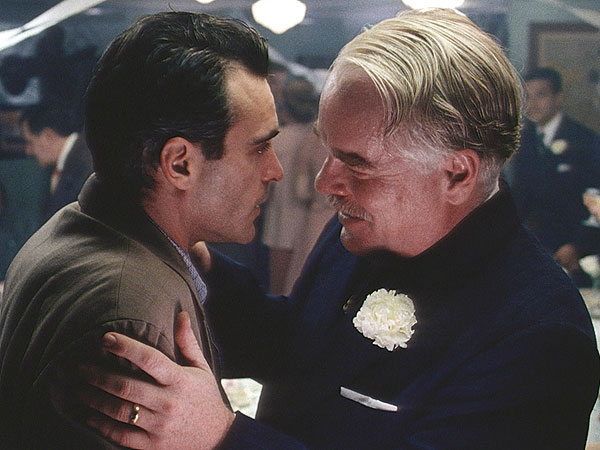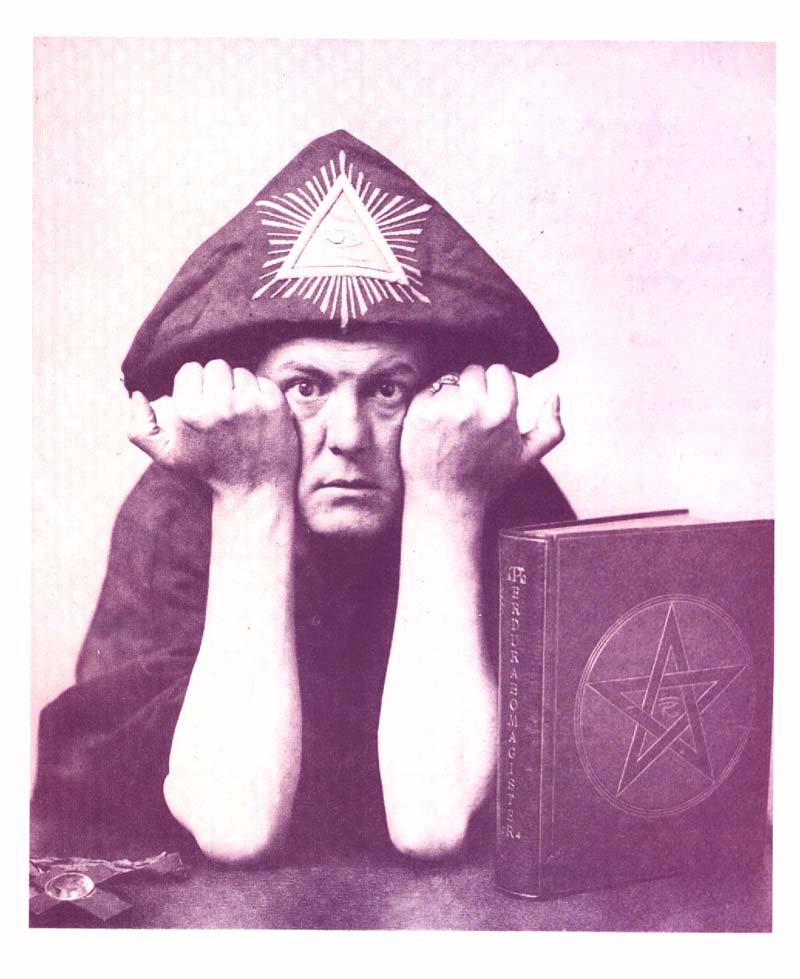THURSDAY, MAY 19
The First Grader 7 p.m., McCaw Hall
Based on the true story of an 84-year-old Kenyan who took his government’s “education for all” promise literally, The First Grader turns literacy into historical melodrama. Character is history in Justin Chadwick’s dramatization of the story that made international headlines in 2003, a choice that gives the film a rough start. When a free primary school is opened in a remote Kenyan village, Maruge (Oliver Litondo), the recent recipient of a government letter he is determined to read for himself, shows up ready to learn. After being turned away by the bemused principal, Jane (Naomie Harris), and her prickly colleague, Alfred (Alfred Munyua), several times, Maruge finally gets to join the one-room schoolhouse when Jane relents. Word spreads almost immediately, and the villagers, having earned their freedom from British rule decades before, are paradoxically quick to lapse into greed and intolerance among themselves. Chadwick veers frequently into flashbacks to Maruge’s past as a Mau Mau resistance fighter that do little to inform or propel the present-day story. Poorly defined tribal lines flare up, and Jane’s life is threatened, the point at which the script’s Hollywood contrivances open up and swallow this often charming film whole. MICHELLE ORANGE (The film appears at the Metro next week.)
FRIDAY, MAY 20
[PICK] Copacabana 4:15 p.m., Egyptian
Isabelle Huppert is such a fearless actress that you’re willing to follow her anywhere, no matter that some of her key roles (The Piano Teacher, Time of the Wolf, etc.) have been very, very dark. Worry not: Copacabana is very, very light, though the comedy is rooted in the recession and real-estate bubble that hit Northern France just as hard as here. “Babou” (actually Elizabeth) is an aging and irresponsible bohemian, a former beach bum whose propriety-minded daughter decides to avoid embarrassment at her imminent wedding. Broke and defiantly anti-bourgeois, Babou finds herself off the guest list. Shocked and hurt, she takes a new job over the border in Oostende, Belgium, to sell time-share vacation condos. Totally unqualified and rude to almost everyone around her (save for a pair of young hippies living on the beach, as she once did), Babou sets herself up to fail. The surprise, as she navigates a new town, new trade, and new boyfriend, is what a survivor she turns out to be. Though her new office is like an all-female production of Glengarry Glen Ross, Babou learns to sell, to close deals, and not to scorn straight society quite so much. Granted, her corporate makeover is a ploy to get back in the good graces of her daughter (played by Huppert’s daughter, Lolita Chammah). But more important for writer/director Marc Fitoussi, Babou’s stubbornness represents a small, heroic gesture of resistance against the system. She’s still got sand in her hair. BRIAN MILLER (Also: Admiral, 5:30 p.m. Sun., May 22 and Renton, 6 p.m. Tues., May 24.)
P3 7 p.m., Neptune
Tom Tykwer’s new romantic triangle is a comedy with a genetic premise. One of its Berlin trio is a scientist who runs a gene-splicing company, where cell walls are routinely pierced and impregnated with new instruction sets. In this brave new world, 3 argues, biology is no longer destiny. Everything and everyone is mutable, and that includes the stale 20-year relationship between Simon and Hanna. Childless, unmarried, and infertile, they live in a bubble populated by fellow artists and intellectuals. New experiences are not to be expected until—enter the DNA probe—Hanna falls for enigmatic scientist Adam, who professes never to even read books. He lives alone in a sterile apartment, though his company profits from in-vitro fertilization for countless grateful couples. What comes next, as Hanna—astonished by her own actions—hooks up with Adam, and Simon suffers a health crisis, could’ve been treated as farce or tragedy. Fortunately, after a rather long, dull mid-career slump (Heaven, Perfume, The International), the German director of Run Lola Run has returned to form, using split screens, voiceovers, and fantasy sequences to advance his hybrid story. It’s full of weighty ideas, yet is wonderfully light on its feet. “Life is unpredictable,” admits control-freak Hanna (the perpetually exasperated Sophie Rois). And so is 3—or so Tykwer would like us to believe. (Cynics will easily guess how determinism is to be toppled.) Is 3‘s thesis convincing? No. But is it warm, funny, compassionate, and entertaining? Definitely. BRIAN MILLER (Also: 1:30 p.m. Sat., May 21.)
Black, White and Blues 7:30 p.m., Renton
Local actor Tom Skerritt has a small but significant role in this straightforward redemption drama, set among the blues clubs, churches, and pickup trucks of the rural South. The black guy (Michael Clarke Duncan of The Green Mile) is the mysterious redeemer who pilots the pickup truck. The white guy (co-writer Morgan Simpson), his passenger, is an alcoholic blues guitarist with terrible stage fright, lured from Austin back to Huntsville, Ala., by the promise of an inheritance. That windfall might allow him to repay an angry loan shark (a surprisingly feral and effective Luke Perry!). Then there’s the matter of his scattered, hard-luck family and former hometown girlfriend, whom he abandoned long before. Do you doubt that every string of this guitarist’s woeful life story will be plucked, held, and resolved? Can you foresee that the black and white guys might have a secret bond, that their fates might be bound by destiny—or perhaps even a higher power than that? Skerritt, playing a roadhouse owner called Santa, dispenses sage advice while conspicuously sipping water and tea. As his equally teetotaling protegé, Duncan embraces his savior role with gusto; if he could nail himself to the cross, he would. Though handsomely shot and capably directed by Mario Van Peebles (a long way from New Jack City), Black, White and Blues gradually reveals itself to be more intent on Sunday morning than on Saturday night. BRIAN MILLER (Also: Neptune, 4 p.m. Sun., May 22 and Everett, 3:30 p.m., Sun., May 29.)
[PICK] Apart Together 9:30 p.m., Admiral
There’s a heartbreaking soliloquy in the middle of this very interrupted love story—a gap of 50 years, to be precise, caused by the Communist takeover of China—that takes place in an ordinary Shanghai noodle shop among three elderly patrons. The great mainland actor Xu Cai-gen sadly and smilingly extends his blessing to his wife (played by Lisa Lu) of five decades and the visitor (Ling Feng) who intends to take her away to Taiwan. The latter two were lovers in the ’40s and conceived a child together; then he and his fellow soldiers in the Kuomintang Army retreated to Taiwan. Xu’s character, Lu Shan-ming, married the pregnant young woman and supported her, and they raised a blended family together. Now, in modern, booming Shanghai, with their kids and grandkids aghast at the idea, the kind-faced Taiwanese visitor offers compensation money to the clan for removing its matriarch. Yet Lu Shan-ming assents to the deal, and he doesn’t even want the money! (Again, his kids and grandkids are astonished.) Maybe, he sighs, “I don’t know what love is.” His marriage was practical, and he recognizes the other two are still in love. And all three elders have endured war and hardships the younger generations can’t understand. To survive, compromises must be made, and Lu Shan-ming isn’t even bitter about it. Instead, he’s almost liberated—taking up smoking again, cooking for and befriending their Taiwanese house-guest (who in turn is moved by such generosity). In all, an exquisite work from director Wang Quan’an (Tuya’s Marriage). BRIAN MILLER (Also: Renton, 1 p.m. Sun., May 22 and SIFF Cinema, 9:30 p.m. Wed., May 25.)
[PICK] High Road 9:30 p.m., Neptune
Can an ensemble of a dozen of the best sketch comics working today carry a feature rooted in the most rote of cinematic conceits, the stoner road flick? That’s the question Upright Citizens Brigade co-founder and ace Frat Pack character actor Matt Walsh poses in his directorial debut, and the answer is a resounding yes, due in large part to the wiles of its cast. It’s as though Saturday Night Live, The Office, and the supporting casts of every Will Ferrell and Paul Rudd vehicle ever made exploded onto the screen. What ensues is consistently hilarious. Centered on an L.A. pot dealer (James Pumphrey) and his 16-year-old neighbor (Dylan O’Brien, soon to star in MTV’s seemingly ill-advised Teen Wolf remake), who escape to Oakland together for differing reasons, Walsh employs the thinnest of plots to showcase the improvisational talents of his players, the most impressive of which is the great Joe Lo Truglio (Role Models, Superbad) as a sheriff’s gymnasium trainer who yearns to be an actual cop. SNL‘s adorable Abby Elliott, playing it straighter than anyone else as the pot dealer’s girlfriend, shows she has what it takes to follow Fey, Poehler, and Wiig to big-screen stardom. But it’s Rich Fulcher’s turn as a cross-dressing, cock-hungry cabaret singer that deserves its own spinoff. MIKE SEELY (Also: Admiral, 8:30 p.m. Sat., May 21 and Egyptian, 9:30 p.m. Tues., June 7.)
Outside the Law 9:30 p.m., SIFF Cinema
Rule of law scarcely discourages the endless reprisals in Rachid Bouchareb’s Algerian War–era family-ties drama, which shows the FLN’s militant campaign for Algerian independence, as fought on French soil, through the experiences of three brothers. Reuniting in a Nanterre shantytown, this tattered family brings with it the shared memories of being rejected from their ancestral land to make room for French settlers and the 1945 Sétif Massacre (controversially staged—and controversially received at Cannes). Saïd (Jamel Debbouze) is the black sheep, while lanky and remorseful big-brother Messaoud (Roschdy Zem), a veteran of the French military embarrassment in Indochina, serves as triggerman for true believer Abdelkader (Sami Bouajila), channeling his everything to the cause. Outside the Law, sympathetic to that cause while not ignoring the human cost, belaboring a parallel between FLN activity and the French resistance, and alleging extralegal terror by the Paris police, stirred up a polemic kerfuffle with some in France and was greeted as a necessary historical corrective by others. Necessary, that is, if movies are only ideological counterbalances—an uncommitted American viewer may be most distressed to find that scarcely one scene in this two-and-a-half-hour lug has any contour or tempo. The production design is nice enough, but Bouchareb’s four-country co-production isn’t an epic—it’s just long. NICK PINKERTON (Also: Admiral, 9 p.m. Wed., May 25.)
SATURDAY, MAY 21
[PICK] Cameraman: The Life and Work of Jack Cardiff 11 a.m., Harvard Exit
“He gave me half my performance with the lighting,” says actress Kathleen Byron of cinematographer Jack Cardiff, who shot her in 1947’s Black Narcissus. A rebuke to style-versus-substance segregationists, these words pay tribute to the star of Craig McCall’s documentary, a soapbox for the wizened eminence to explain the innovative effects he achieved with a Technicolor camera the size of a sedan while narrating his epoch-spanning career. The son of music-hall actors, Cardiff began in movies in 1918 as a child performer. An autodidact whose “film school” was the National Gallery, he trained as England’s first colour cinematographer, shot Narcissus and other legendary collaborations with Michael Powell, directed Sons and Lovers and several ingenious, scurrilous B-movies, then returned to cinematography to immortalize the sweat-beaded torsos of Stallone and Schwarzenegger in the ’80s. Cardiff shows off a gallery of famous co-workers on his wall and counts the casualties: “He’s dead, she’s dead . . . ” You can do the same with interviewees in Cameraman, 17 years in the making: Directors Peter Yates and Richard Fleischer, DP Freddie Francis, Charlton Heston—and Cardiff himself, whose inextricable life and work ended in 2009. Director Alan Parker (still living) nicely describes the tightrope teeter of Cardiff’s hothouse imagery: “It’s great art, and then it will be kitsch, and then it will be art again.” Or is he summing up cinema itself? NICK PINKERTON
Black Venus 11:30 a.m., SIFF Cinema
“Punishing” is an adjective that will only attract a certain kind of moviegoer. Did you love inner-city shame spectacle Precious so much that you thought it could have gone an hour longer? Then you’ll feel the same way about French-Tunisian writer/director Abdellatif Kechiche’s Black Venus. Rather than on an overweight, illiterate Harlem victim of incest, Kechiche’s three-hour epic centers on the humiliating life and times of Saartjie Baartman, a young South African girl whose oversized butt and genitalia earned her the name “the Hottentot Venus” and the unwantable distinction of being early 19th-century Europe’s most in-demand carnival-sideshow freak. Baartman (played by Cuban-born first-timer Yahima Torres) is endlessly gawked at and groped in London salons and Parisian parlors, with an emphasis on “endlessly”—God help anyone with a weak circulatory system, small bladder, or thin tolerance for onscreen degradation. Even gluttons for punishment will wish for an intermission. CALEB HANNAN (Also: Egyptian, 8:30 p.m., Sun., May 29.)
[PICK] The Trip 3:30 p.m., Harvard Exit
Director Michael Winterbottom had so much fun making the 2005 Tristram Shandy with comic stars Steve Coogan and Rob Brydon that he signed up to do a recent TV series with them. Essentially, Coogan—a much bigger name in the UK, thanks to his Alan Partridge character—would drive around the North Countries, with Brydon as his wingman, and write about food. Or here talk about food. Or, mainly, talk about their respective careers (why can’t Steve get the big roles he thinks he deserves in Hollywood?), romantic misfortunes, the humiliations of aging, and whatever else comes to mind. Their priceless improvisatory banter is framed, fake-documentary style, by their public images: Rob and Steve are playing versions of themselves, with Rob the contented family man whose small-screen success has recently earned him an iPhone app. And lonely, philandering Steve, movie Steve, is haunted by his tabloid past with strippers, drugs, and even Courtney Love. This Steve is constantly one-upping Rob, resulting in hilarious dueling impersonations of Michael Caine (“It’s all from the nose!”) and Roger Moore. The humor and put-downs during this culinary road trip are very British, very specifically British, and not every reference will land on American ears. Also, because the movie is stitched together from several TV episodes, there’s a lot of repetition. If you love Brydon’s first Al Pacino impression, you may not laugh so much at his fourth. Still, it’s the funniest film I’ve seen this spring, one that even turns ABBA’s “The Winner Takes It All” into a rueful anthem of middle age. BRIAN MILLER (Also: Admiral, 9:15 p.m. Mon., May 23.)
[PICK] The Pipe 4 p.m., Egyptian
It’s impossible to remain unmoved by this alternately scenic and raw portrait of an Irish fishing and farming burg bulldozed by Shell’s construction of an offshore gas pipeline. The tough-minded locals can’t agree on an organized, united campaign that leverages their property rights and moral authority, though it gradually becomes clear that they’re overmatched in any event against the multinational fossil-fuels purveyor and the complicit government. The film achieves its extended, heart-pounding climax thanks to heroically defiant, chain-smoking crab fisherman Pat “The Chief” O’Donnell, who makes his solo stand in the open sea tilting at Shell’s gargantuan pipe-laying ship. The Pipe provides but a few fleeting moments of inspiration and absolutely no catharsis; it’s the end of the world as we know it, yet again. MICHAEL FOX (Also: Harvard Exit, 4:30 p.m. Tues., May 31.)
Touch 6:30 p.m., Renton
At its core, Touch is a film about a gorgeous Vietnamese manicurist named Tam (Porter Lynn) who helps a hunky mechanic named Brendan (John Ruby) save his marriage through a series of romantic tips. She also feverishly scrubs the grease off his hands every day, as the mechanic is under the impression that his corporate lawyer wife (Melinda Bennett) won’t let him touch her due to their griminess. The dialogue in the film is almost parable-like in its simplicity, although Tam’s co-workers provide a fair amount of comic relief through a series of off-color conversations. (Their scenes play like an Asian-American Barbershop.) The film’s leisurely first half ends up serving as the narrative foreplay for its smoldering second act, which includes a healthy amount of kitchen-counter sex and bubble baths for two. Tam and Brendan ultimately find satisfaction, but the film leaves us wondering whether they’ve run into the right sets of arms. The extent to which writer/director Minh Duc Nguyen is able to flesh out a harsh subplot concerning Tam’s depressed and disabled father (Long Nguyen) is a small miracle given the film’s deliberate pacing. MIKE SEELY (Also: Admiral, 6:30 p.m. Mon., May 23.)
The Future 7:30 p.m., Pacific Place
Back in 2005, fresh from its success at Sundance and Cannes, Miranda July’s debut feature Me and You and Everyone We Know was selected to open SIFF. I was scheduled to interview her, but she was abruptly whisked back to Cannes—still underway—to accept a prize. Never mind the snub, Me and You was third on my 10-best that year; yet her follow-up has taken six long years to arrive. The life parallels are impossible to ignore as July again plays an artist—well, a children’s dance instructor—who’s seriously blocked about her next creative project. Living with her supportive but undermotivated boyfriend in a threadbare L.A. apartment, Sophie is aware she can’t be a slacker through the rest of her 30s. Either create or get off the pot. Yet her YouTube dance project (“30 Dances in 30 Days”) is just as stalled as everything else in their lives. She and Jason (Hamish Linklater of The New Adventures of Old Christine) can hardly even commit to foster-parenting a cat waiting for them at the vet’s. In July’s high, mewing voice, the cat speaks to us of darkness and despair. Much later, as the sitcom slides into a magical fable, the moon will also express its thoughts on Sophie and Jason’s fraying relationship (they both stray, though in different ways). So what does The Future hold for Sophie? July shows us two scenarios in a kind of parallel-lives projection for her heroine: failure in bohemia and mediocrity in the ‘burbs. Unfortunately, the film completely fails on both levels. Me and You was expansive, curious, generous. The Future just collapses under the weight of its introspective gravity. BRIAN MILLER (Also: SIFF Cinema, 4:30 p.m. Mon., May 23.)
Fire of Conscience 9:30 p.m., Neptune
Dante Lam’s stylish Hong Kong cop flick doesn’t place a great premium on plot clarity. And once you sort out the flashbacks and names, you realize the plot—dirty cop versus psychologically damaged good cop—isn’t all that complicated. Between the shootouts, and there are many, the good cop and the bad cop trade lines like “We’re both dragons” and “You and I are the same.” But are they? The good cop, traumatized by the death of his wife, lives in a van and wears a scruffy hermit’s beard. For fun, he chases down pickpockets, beats them up, and shaves their heads to humiliate them. “Cops like you are extinct,” he’s told. But are they? Meanwhile, there’s a mad bomber/cop killer being pursued; you know he’s the chief baddie because his name is Blade. Blade. How many parents are naming their newborn sons Blade these days? That’s got to rank way behind Wyatt. While not rising to the clever intrigue of Infernal Affairs, Fire of Conscience could become a decent English remake. Text messages trigger intense gunfights; stolen SIM cards matter as much as dead hookers; and grenades roll around teahouse floors like errant egg rolls. We can just imagine how the dialogue will be translated from the Cantonese. Bad cop to good cop: “We’re two sides of the same coin, you and I.” But are they? BRIAN MILLER (Also: Egyptian, 9:30 p.m. Tues., May 24.)
LOVE 10 p.m., Pacific Place
A sci-fi mashup of Terrence Malick and Kubrick’s 2001, LOVE (or LO(VE, as the filmmakers spell it) isn’t shy about displaying its influences. It began as a sidebar project for the band Angels & Airwaves, which supplies the score, and some of its loveliest sequences are simply musical and visual. A forlorn space station hangs in the darkness, circa 2039, its sole astronaut left to fend for himself. A Civil War bombardment pulses through the earth, the concussion waves raising the dirt in super-slo-mo. Fine, so far as images are concerned, but the story—or parallel stories—has to develop somehow. The stranded astronaut (Gunner Wright) eventually finds the diary of a Civil War lieutenant (Bradley Horn) also dispatched on a distant errand somewhere out West. What will they find? Will they be rescued? And what’s with the periodic interviews with regular folks living down below on 21st-century Earth? Written, photographed, and directed by William Eubank, LOVE is far more polished than your average indie, but funding isn’t the same as thinking. Though fascinating at first, the movie never generates the ideas necessary to escape its spiraling death orbit. And the end is just Rod Serling. BRIAN MILLER (Also: SIFF Cinema, 1:30 p.m. Sun., May 22 and Egyptian, 9:30 p.m. Sat., June 11.)
SUNDAY, MAY 22
Circus Dreams 11 a.m., SIFF Cinema
Nervous tweens and their stage moms pacing in the background, glittery typeface, and a charismatic emcee duo who could very well be Ryan Seacrest and Ryan Dunkle-man—then the clown noses and trapezes suddenly make it clear this isn’t American Idol or some pedestrian documentary. Signe Taylor’s Circus Dreams follows Circus Smirkus, the only traveling youth circus in the U.S., and 36 auditionees who want nothing more than to juggle, clown, and otherwise entertain crowds of squealing children and parents on a seven-week tour. “My circus personality and my normal personality are a little different,” says prospective clown Maddie. “Like, when I’m in school, I have to be calm and a regular person; and in circus I can let myself go without any restrictions whatsoever.” Vermont juggler Jacob also finds a sense of community missing outside the ring: “I got a little sad in middle school. I was just having a lot of trouble developing relationships with my classmates.” By the end of the circus tour, no surprise, he and his fellow performers are all BFFs, treasuring the bonds formed under the big top. Circus Dreams fondly and nostalgically recalls such vibrant shades of a forgotten adolescence. It also presents more than a few opportunities for us to giggle and gawk—and is best served with peanuts. COLIN GORENSTEIN (Also: 11 a.m. Sat., June 4.)
Crying Out 6:30 p.m., Pacific Place
A middle-aged businessman (Michel Barrette) is finding it very hard to get over his wife’s death, which leads him, a few days after the funeral, to do something extremely ill-advised. On the run from one cheap motel and bar to the next (who knew Quebec was so white-trashy?), he’s pursued by his irascible father (Jean Lapointe), sprung from a nursing home, and hot-headed, estranged son (Patrick Hivon). Robin Aubert’s drama, dotted with dark comedy, is compelling but slightly wearying, with the sordidness eventually seeming a little gratuitous—OK, so Dad picks up a worn-out, bleached-blonde waitress, fine, but do we have to see her breast-feed him? Grandpa grew on me, and the son has a plausible cause for his dysfunction (as we learn in an opening scene in which we see nothing but which sonically is as explicit as can be). But Dad I really wanted to get the fuck over himself. GAVIN BORCHERT (Also: 4 p.m. Mon., May 23.)
[PICK] Pinoy Sunday 6:30 p.m., Renton
Filipino guest workers always get the short end of the stick, from Saudi Arabia to Taiwan, where this gentle comedy is set. The MacGuffin that launches Dado and Manuel’s Sunday adventure is a red leather couch abandoned on the sidewalk by an affluent Chinese couple. They don’t want it, so our heroes decide to lug it back to their factory dormitory. “God is telling us something,” says the younger, lighthearted Manuel. With only one day off, looking forward to smoking and drinking on the roof of their dorm, the couch is the upholstered embodiment of all their hopes and dreams—something near and obtainable, unlike older Dado’s wife and kids back in the Philippines, and unlike the local women Manuel would like to date. But dreams and reality are two different things. Through their tiring, picaresque trek across the city, their burden seems heavier. “As we get closer, it gets bigger,” sighs Dado. They’re like Laurel and Hardy struggling with their bulky prize, or two characters in a Beckett play. At a certain point during their haphazard journey, which includes a short musical interlude, you realize friendship and loneliness are the real subjects at hand—the couch doesn’t matter at all. In Wi Ding Ho’s amiable bromance, Dado and Manuel have only each other for support in this strange, distant country. BRIAN MILLER (Also: Pacific Place, 7 p.m. Tues., May 24 and 4:30 p.m. Thurs., May 26.)
Flamenco, Flamenco 7 p.m., SIFF Cinema
Or maybe a better title for Carlos Saura’s dance-and-music showcase, elegantly shot by the great cinematographer Vittorio Storaro in what looks to be an aircraft hanger, would be Flamenco, Flamenco, Flamenco, Flamenco . . . well, you get the idea. There are 21 separate performances here, many with overlapping artists, and the level of talent is fairly dazzling. It’s also somewhat redundant. If you don’t already love the plaintive songs, rhythmic clapping, Spanish guitar, and foot-stomping dance style, this Iberian cultural immersion may pass in a blur. At its best, Flamenco comes at you like a freight train of eros—particularly the fierce-eyed female dancers. At its worst, the movie can seem like a gathering of constipated male tenors all dressed like Julio Iglesias. It’s a film for flamenco purists, for an art form locked in peninsular amber. And as if to emphasize—well, overemphasize—its historical import, Saura surrounds his performers with giant reproductions of works by Goya and other painters who depicted flamenco artists. Flamenco, Flamenco is a bit of a museum piece, but a living museum piece. Each virtuoso artist and ensemble is identified, and if you remember their names, you can later download them on iTunes. No surprise, this is a sequel to Saura’s 1995 Flamenco. And if there’s a third installment, I wonder what they’ll call that movie . . . ? BRIAN MILLER (Also: Everett, 4:30 p.m. Fri., May 27 and Egyptian, 11 a.m. Mon., May 30.)
[PICK] Moulin Rouge! 9 p.m., Egyptian
Being shown as part of SIFF’s tribute to Ewan McGregor (who won’t attend tonight’s screening), Baz Luhrmann’s 2001 musical borrows shamelessly yet feels utterly fresh and original. Layer-caked in fabulous artifice, it’s his biggest, grandest, most heartfelt work as a director. The flamboyant, cartoonish, often headache-inducing Moulin has maybe a thousand musical cues that trigger samples, covers, and bits of original songs, yet Luhrmann does his cribbing with a loving wink. In 1899 Paris, a naive aspiring writer (McGregor) is enchanted by a glamorous chanteuse (Nicole Kidman). She’s a supposedly hard-hearted courtesan at a decadent cabaret (run by the apoplectically comic Jim Broadbent). Purportedly a film about love, Moulin‘s really about Luhrmann’s love of showbiz—which outlasts both love and life. BRIAN MILLER
[PICK] Without 9:30 p.m., Harvard Exit
Nineteen-year-old Joslyn gets a summer job housesitting and taking care of a senile old man named Frank while his family’s away on vacation. She’s told “Don’t let him push you around”—a joke, since he doesn’t communicate beyond occasional moans and grunts. In a house deep in the woods, Joslyn (local actress Joslyn Jensen) feeds him mashed fruit, changes his diapers, and parks his wheelchair in front of the TV, tuned to the fishing channel. Without cell-phone or Internet service, she does yoga, works out (pointedly improving her body while Frank’s decays), examines her naked figure in the mirror, even goes on a date with a local loser. Mostly, though, she flips through her iPhone videos and photos of an unnamed dark-haired girl. Shot on Whidbey Island by Seattle-raised director Mark Jackson, Without moves slowly until its breathless last half, when Joslyn succumbs to cabin fever, something like in Roman Polanski’s Repulsion. Who is that girl in the photos? What’s her connection with Joslyn? Where did her phone go, and what caused the enormous blotchy bruise on her back? Not all questions are explicitly answered in Jackson’s skillful first feature, and there are nice little grace notes among the gloom, like when Joslyn records herself covering Lil Wayne’s “Lollipop” on a ukulele, with mysterious tears in her eyes. ERIN K. THOMPSON (Also: Egyptian, 4:30 p.m. Mon., May 23.)
MONDAY, MAY 23
Dance Town 6 p.m., Renton
Ordinarily I’m a fan of unrelentingly grim South Korean cinema. However, there is no dancing in Dance Town—no sad dancing, no happy dancing, no dancing of any kind. Instead, North Korean defector Jung-nim (the fine, gradually deflating Ra Mi-ran) slowly discovers that life in the south is a different kind of hell. The streets, it turns out, are not paved with gold. Separated from her husband, who’s been arrested in the north, Jung-nim is patronized and humiliated by her handlers in Seoul. Outside her government-supplied apartment, she’s monitored on surveillance video, in case she’s a spy. (The irony, of course, is that her neighbors were spying on them back home—hence the sudden flight after being denounced for watching a forbidden porno on VHS.) Jung-nim struggles to adjust to her new, solitary life—first working in a laundry, then as a social-services helper. In one raw, affecting visit with a shut-in, suicidal paraplegic client, she commiserates, “Isn’t it the same everywhere?” They may use firing squads up north; but in the south, they just leave you to die of loneliness. Director Jeon Kyu-hwan amplifies that point by needlessly following a few extraneous characters (a pregnant teen, a cop looking for quick sex, etc.), which only distracts from Jung-nim’s travails. Her story, alone, makes you worry about what’ll follow when the two Koreas inevitably unite. BRIAN MILLER (Also: Harvard Exit, 9 p.m. Mon., May 30 and Admiral, 9 p.m. Wed., June 1.)
TUESDAY, MAY 24
[PICK] Beginners 4:30 p.m., Neptune
Thumbsucker director Mike Mills is up-front about the personal origins of his second feature, about a man in his 70s who, after becoming widowed, tells his adult son he’s gay. That’s what happened to Mills, whose suddenly liberated father died five years later. So how does one reinvent a parental relationship after decades of polite, loving deception? And how might the protagonist of Beginners—Ewan McGregor, who’ll attend SIFF with Mills—then be wary of any kind of relationship? Whom can you trust? Can you even trust yourself to be honest? All of which sounds like a navel-gazing puddle of indie mope-itude, but Mills fractures his story into so many elements—grief, graffiti, comedy, new romance, the challenge of designing CD booklets, and a dog whose thoughts are communicated in subtitles—that Beginners escapes solipsism into something tender and moving. As the newly outed parent, Christopher Plummer declares, “I don’t want to be just theoretically gay—I want to do something about it.” And he does, unlike his uptight, pensive son Oliver (McGregor), a commercial artist whose grieving passivity attracts the interest of a visiting French actress (Mélanie Laurent of Inglourious Basterds) at a party. Their burgeoning hotel-room relationship follows his father’s death; Beginners frequently skips forward and back—with some animated excursions, too—in the history of the Fields family. (Mills must’ve raided every vintage furniture story in L.A. for the impeccably art-directed ’70s flashbacks.) The film’s fluid chronology eddies back on itself, making Oliver’s dead parents a living part of his slow revival. BRIAN MILLER (The film opens in theaters June 10.)
The Poll Diaries 9:30 p.m., SIFF Cinema
In 1914 Estonia, it’s the eve of World War I. Oda, a 14-year-old girl, arrives home carrying the remains of her mother in a coffin and a two-headed fetus in a jar. The former is to be buried, the latter to be examined. Her oddball scientist father Ebbo, discredited in the academic community, delights in experimenting on the dead. While Oda shares a similar scientific bent and “thinks like a man,” her aims are much more altruistic than his—and potentially more fatal. While Ebbo cuts into the brains of dead criminals, Oda uses her skills to secretly harbor and nurse a wounded anarchist. Her family home is built on stilts, hinting at the precarious balance of their prewar lives in a Baltic land uncomfortably shared by Germans, Russians, and Estonians. The Poll Diaries is based on the memoirs of German poet Oda Schaefer, a distant family relation of director Chris Krause. Using minimal dialogue, he creates a powerful, cinematic sense of place—an oasis soon to be obliterated by war. Oda is oddly at ease among the dissected corpses in her father’s macabre laboratory, yet she’s not yet grown up enough for a real, sexual relationship with the anarchist. Not for the squeamish, perhaps, The Poll Diaries doesn’t flinch at the consequences when a gun is fired. And to be sure, the story ends with a bang. KRISTY HAMILTON (Also: Admiral, 9 p.m. Fri., May 27 and Neptune, 9:30 p.m. Mon., May 30.)
Trigger 9:30 p.m., Harvard Exit
One long, boring cigarette of a movie, Bruce McDonald’s Trigger is one of those “What does it all mean?” flicks set in a Toronto music scene that ought to be a lot more interesting than it is. Kat (Molly Parker) and Vic (Tracy Wright) are former bandmates in the punk group Trigger. When Kat visits from the U.S., they get together for dinner before a benefit show in which the two might or might not play together for the first time since their onstage breakup a decade earlier, a flashback that opens the film. What transpires is a lot of soul-searching, clichés (fighting, jealousy, starry-eyed fans), and a fistful of bar chords. Even 78 minutes is too much. CHRIS KORNELIS (Also: 4:30 p.m. Wed., May 25.
